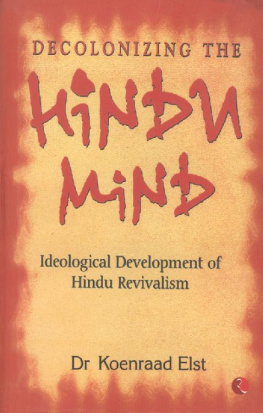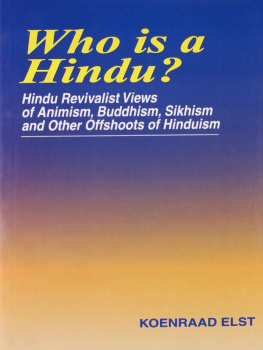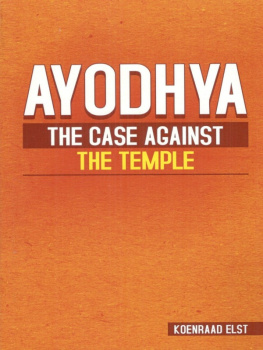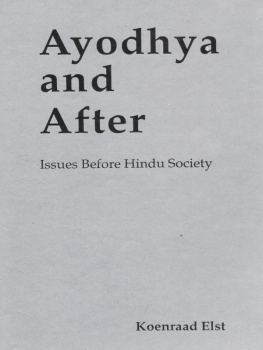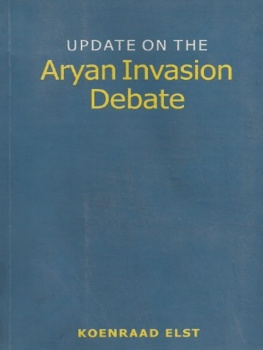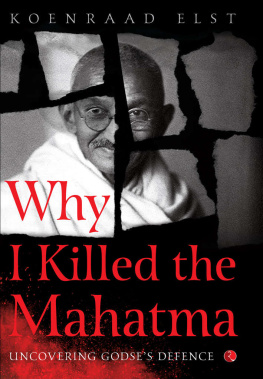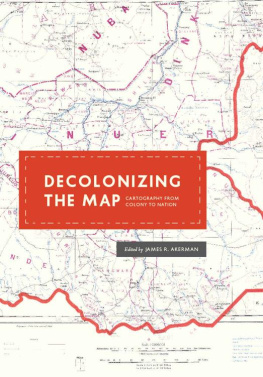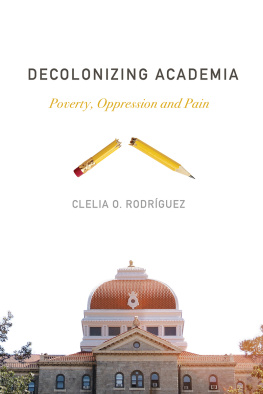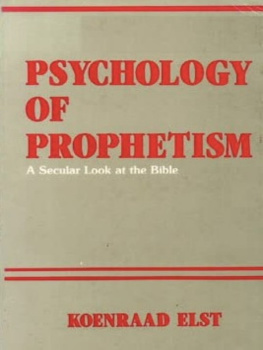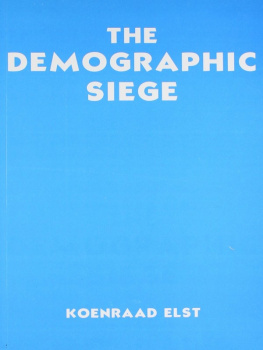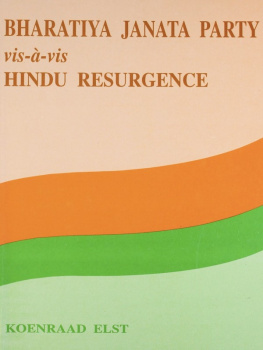DECOLONIZING THE HINDU MIND
Born in a Flemish Catholic family in Leuven, Belgium, in 1959, Dr Koenraad Elst graduated in Philosophy, Chinese Studies and Indo-Iranian Studies from the Catholic University of Leuven. He became interested in communal disputes in India during a stay at the Benares Hindu University, and wrote his first book on the budding Ayodhya conflict. While establishing himself as a columnist for a number of Belgian and Indian papers, he frequently returned to India to study the various aspects of its ethno-religio-political configuration and to interview the countrys religious leaders and thinkers. Decolonizing the Hindu Mind is based on his doctoral thesis, submitted at Leuven in 1998. He has written copiously on multiculturalism, language policy issues, ancient Chinese history and philosophy as well as on subjects such as comparative religion and the Aryan invasion debate.
Decolonizing the Hindu Mind
Ideological Development of Hindu Revivalism
KOENRAAD ELST
Published by
Rupa Publications India Pvt. Ltd 2005
7/16, Ansari Road, Daryaganj
New Delhi 110002
Copyright Koenraad Elst 2001, 2005
All rights reserved.
No part of this publication may be reproduced, transmitted, or stored in a retrieval system, in any form or by any means, electronic, mechanical, photocopying, recording or otherwise, without the prior permission of the publisher.
ISBN: 979-81-291-0746-5
10 9 8 7 6 5 4 3
The moral right of the author has been asserted.
Typeset by Pradeep Kumar Goel, New Delhi
This book is sold subject to the condition that it shall not, by way of trade or otherwise, be lent, resold, hired out, or otherwise circulated, without the publishers prior consent, in any form of binding or cover other than that in which it is published.
Dedicated to the memory of my father,
Dr. jur. Ren Elst (1924-92)
Hij was rechtvaardigheid
Contents
Acknowledgements
My thanks are due to all those who made the completion of this text possible, starting with the elements, the ancestors, and so on down to mainly the following people. My wife Christel more than shared the hardships intrinsic to a writing job of this magnitude, and her effort in making it possible was inevitably greater than that of all others, perhaps including me. Access to primary sources, human and textual, was given to me by some of the people whose work is also the object of this research, most notably K.R. Malkani, Sita Ram Goel and Devendra Swarup. Practical and material help was given me by Kashi Nath Singh, Veer Bhadra Mishra, Pradeep Goel, Sujit Dhar, Manju Jhaver, Shrikant Talageri, Tushar Ravuri and Gopi Maliwal; and by Manohar Shinde, Arvind Ghosh, Krishna Bhatnagar, Satinder Trehan, Shrichand Chawla, Anand Bemra, Rama Shastry, Jaidev Rao, Raj Dave, Yamini Liu, Graydon Chiappetta, and Raman Srinivasan. For academic insights on the subject-matter, I should thank the late Professor Kedar Nath Mishra (Benares Hindu University), Professor Edmund Weber (J.W. Goethe University, Frankfurt), Professor Gopal Krishna (Wolfson College, Oxford), and my supervisor, Professor Gilbert Pollet. The list, let it be repeated, is not exhaustive.
This book is based on the main part of my doctoral dissertation, accepted by Katholieke Universiteit Leuven in 1998. For reasons of space, several peripheral chapters have been left out here and will be published separately. Conversely, some argumentative sections which I had left out of my dissertation at the suggestion of my supervisor have been reincluded, and the general tone and conclusions have been made more forthright than was affordable in a dissertation. It follows that the responsibility for controversial statements in this study does not lie with my Alma Mater, the examiners or my supervisor, but is entirely my own.
Leuven, Belgium | KE |
20 January 2001 |
Note on language and transcription
The present study is a text written in English, but in an age when different standards of English legitimately co-exist, this needs some specification. As to spelling, when in doubt I have followed the Concise Oxford English Dictionary, 1986 and its occasionally surprising norms (labour organization), except in quotations. It is possible that I have failed to doubt on occasions when I should have, in which case deviations from the Oxford standard may occur. In quotations, Indian English is often retained, which includes many uncommon cases of using or not using the article, peculiarities in the use of capitals and word order, and borrowed native vocabulary. I have considered it unnecessarily pedantic to add corrective parentheses to such expressions unless they really disturb fluent comprehension.
Indian words are spelled as in Indian English texts, without any cumbersome diacritical marks, except in italicized quotation words. Names are given in the form used by the person concerned, e.g. one may write Mukherji and another Mookerjee . Dont look for the diacritics in non-italicized words, which are to be considered Indian-English words, and even in italicized book titles they may be absent if that is how the authors chose to spell them. Words derived from Arabic are given in their Persian-Urdu pronunciation, as is common in India, e.g. Hads or Zimm rather than Hadth or Dhimm . For words in Indian languages given in transcription, I have had to settle for a compromise, partly due to the typographical limitations of my antiquated word-processor, partly in order to stay close to the ordinary Indian-English spelling which will be used alongside the occasional transcription: following the system adopted in many Indian scholarly publications, [sh] and [ch] will be used as in regular English spelling. Allowance should also be made for v/w alternation in Sanskrit/Hindi words, both letters representing the English [w]. The choice between the Sanskrit form with - a , the Hindi form without -a ( Rma/Rm ) and the Dravidian form with -an/am ( satya/sathyam , Shrinivs/Shrinivsan ) depends purely on the context.
Glossary
abhinava: young
db arz: Muslim greetings, hello
adhiniyam: act (of legislation), law
adhytmik: spiritual
divs: aboriginal, Christian term for the tribals
dm: scion of Adam, man
advaita: non-two-ness, monism
agnihotra: Vedic fire-ceremony
agrahra: land granted to Brahmin community. Brahmin village
ahl: people
ahl-e-kitb: people of the Book, the Abrahamic religions
AICC: All-India Congress Committee
AIR: All-India Radio
akhand: unbroken, united, continuous
akhr: arena, martial monastery
AMU: Aligarh Muslim University
lim (pi. ulem ): Islamic scholar
Allh (from al-Ilh , the god): Arab deity, God
X amar rahe: may X remain immortal, long live X
amr: commander, rich man
amr-al-mominn: commander of the faithful, caliph
anushlan: devotedness
archan: worship
rya: noble, gentleman; Hindu
shram: stage of life; hermitage
ASI: Archaeological Survey of India
avarna: casteless
avatr: incarnation of a deity
yat: sign, verse of the Qurn
yatollah: sign of God, high-rank Shiite clergy
zd Kashmr: Free Kashmir, i.e. Pak-Occupied Kashmir
zd Hind fauz: Free India Army, INAIndian National Army
zd: freedom
azn: public call to Islamic prayer


